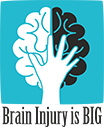empowering the severely brain injured and their families via support, understanding and a network of care
Behavioural/Emotional effects
A brain injury can sometimes ‘rewire’ a person’s personality. This can cause behavioural and emotional effects. Exactly what is changed will depend upon which part of a person’s brain is injured. For example, the frontal lobe is the area of the brain that controls our personality and our impulsivity. If this area of the brain becomes damaged after a brain injury, it is possible that the person will have reduced self-control or restraint and may not be able to moderate their emotions, resulting in irrational behaviour.
It is often the case that the injured person does not realise that they are acting differently compared to how they were before the brain injury. Examples of behavioural and emotional changes may include:
Mood Swings. A brain injury can sometimes change a way that a person feels or expresses their emotions.  Damage to the frontal lobes may mean that they lose the ability to regulate their emotions, and experience random mood swings that are unrelated to how they are actually feeling.
Damage to the frontal lobes may mean that they lose the ability to regulate their emotions, and experience random mood swings that are unrelated to how they are actually feeling.
Unpredictable outbreaks of laughter or crying can be common. They may have a reduced tolerance for stress and frustration, so even something as minor as having the television volume too loud or losing something can lead to an extreme verbal or physical outburst.
Lack of judgement, awareness and disinhibition. The ability to evaluate our personal behaviour to what is around us is a complex skill. This is largely controlled by the brain’s frontal lobes. Damage to this area can affect self-awareness, insight into the consequences of one’s actions, and ability to show empathy or sensitivity. Those injured may also be unable to distinguish when they are being impolite or breaching social etiquette.
Agitation. It’s common for a recently injured person to be uncooperative due to disorientation, confusion and anxiety. They may do things like pull out their IV tubes or experience restlessness because the behaviour acts as a coping mechanism to relieve the stress of the situation.
 Depression. Once the rehabilitation process starts, it is very common for the person to experience depression. This may be as they start to realise the full extent of the problems caused by their injury and any permanent damage that they will have to cope with. It is worthwhile to note that depression is an important stage of mental recovery, because it means they are aware of the reality of their situation. Only then can the person begin to accept the situation and move forward.
Depression. Once the rehabilitation process starts, it is very common for the person to experience depression. This may be as they start to realise the full extent of the problems caused by their injury and any permanent damage that they will have to cope with. It is worthwhile to note that depression is an important stage of mental recovery, because it means they are aware of the reality of their situation. Only then can the person begin to accept the situation and move forward.
Examples: wishing they had not survived the accident, believing life will never be good again.
Anxiety. It is normal for an injured person to suffer from anxiety. They will be faced with situations that didn’t bother them in the past. They may feel anxious being in a crowded room, when they are being rushed, or even with noise.
Inflexibility and obsession. The frontal lobe is where our ability to reason and make sense of things originates. If the frontal lobe is damaged, the person may be unable to do things differently. They may stubbornly stick to a routine or habit. This is because they have lost the ability to consider alternatives and make a decision based on that analysis. Anxiety will make this worse, because the injured person may think that sticking to a routine will make them feel better.
Sexual problems. After a brain injury, a person’s sex drive can either increase or decrease. There are a great many physiological and psychological reasons for this, most of which are due to the hypothalamus (an important structure in the brain which controls hormone levels) being over or under-active. Click here to access Headway’s leaflet, Sex and Sexuality following a Brain Injury.



